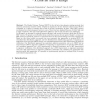Free Online Productivity Tools
i2Speak
i2Symbol
i2OCR
iTex2Img
iWeb2Print
iWeb2Shot
i2Type
iPdf2Split
iPdf2Merge
i2Bopomofo
i2Arabic
i2Style
i2Image
i2PDF
iLatex2Rtf
Sci2ools
121
click to vote
ESORICS
2008
Springer
2008
Springer
Symmetric Key Approaches to Securing BGP - A Little Bit Trust Is Enough
The Border Gateway Protocol (BGP) is the de facto inter-domain routing protocol that connects autonomous systems (ASes). Despite its importance for the Internet infrastructure, BGP is vulnerable to a variety of attacks due to lack of security mechanisms in place. Many BGP security mechanisms have been proposed, however, none of them has been deployed because of either high cost or high complexity. The right trade-off between efficiency and security has been ever challenging. In this paper, we attempt to trade-off between efficiency and security by giving a little dose of trust to BGP routers. We present a new flexible threat model that assumes for any path of length h, at least one BGP router is trustworthy, where h is a parameter that can be tuned according to security requirements. Based on this threat model, we present two new symmetric key approaches to securing BGP: the centralized key distribution approach and the distributed key distribution approach. Comparing our approaches to...
| Added | 19 Oct 2010 |
| Updated | 19 Oct 2010 |
| Type | Conference |
| Year | 2008 |
| Where | ESORICS |
| Authors | Bezawada Bruhadeshwar, Sandeep S. Kulkarni, Alex X. Liu |
Comments (0)

